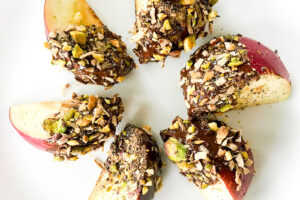
Soak Up the Sun in Style
This month’s Everyday Runway column suits up with some swoon worthy selections to stay safe when out in the sun.

6.
Mask-Querade: In-person events are back. This October 29, the Lyon Family Foundation presents the 4th annual Hoosier Ball, a masked benefit in support of their initiatives, including pediatric cancer.
7.
No Smoke, No Toke: Despite its many health benefits for cancer side effects and growing legality across the country (including Virginia, South Dakota and Connecticut), marijuana use remains low among the cancer community. Researchers at the Virginia Commonwealth University Massey Cancer Center say marijuana use peaks at around 9 percent for cancer patients compared to 14 percent among people with no cancer history.
5.
D-Light: Load up on good foods. A study in the journal Gastroenterology says adults younger than age 50 should consume higher amounts of vitamin D through food as a colorectal cancer prevention strategy. Cases are rising in younger adults, making this news especially relevant.
6.
Mask-Querade: In-person events are back. This October 29, the Lyon Family Foundation presents the 4th annual Hoosier Ball, a masked benefit in support of their initiatives, including pediatric cancer.
7.
No Smoke, No Toke: Despite its many health benefits for cancer side effects and growing legality across the country (including Virginia, South Dakota and Connecticut), marijuana use remains low among the cancer community. Researchers at the Virginia Commonwealth University Massey Cancer Center say marijuana use peaks at around 9 percent for cancer patients compared to 14 percent among people with no cancer history.
4.
Night Light: The Leukemia & Lymphoma Society’s annual Light the Night Walk is back October 23rd and better than ever. Join the event to help raise awareness, find cures and deliver better access to blood cancer treatments. lls.org
5.
D-Light: Load up on good foods. A study in the journal Gastroenterology says adults younger than age 50 should consume higher amounts of vitamin D through food as a colorectal cancer prevention strategy. Cases are rising in younger adults, making this news especially relevant.
6.
Mask-Querade: In-person events are back. This October 29, the Lyon Family Foundation presents the 4th annual Hoosier Ball, a masked benefit in support of their initiatives, including pediatric cancer.
7.
No Smoke, No Toke: Despite its many health benefits for cancer side effects and growing legality across the country (including Virginia, South Dakota and Connecticut), marijuana use remains low among the cancer community. Researchers at the Virginia Commonwealth University Massey Cancer Center say marijuana use peaks at around 9 percent for cancer patients compared to 14 percent among people with no cancer history.
3.
Say it Ain’t Soda: Researchers at the Washington University School of Medicine have found a link between consumption of sugary beverages during adolescence/adulthood and an increased risk of women under the age of 50 developing colorectal cancer.
4.
Night Light: The Leukemia & Lymphoma Society’s annual Light the Night Walk is back October 23rd and better than ever. Join the event to help raise awareness, find cures and deliver better access to blood cancer treatments. lls.org
5.
D-Light: Load up on good foods. A study in the journal Gastroenterology says adults younger than age 50 should consume higher amounts of vitamin D through food as a colorectal cancer prevention strategy. Cases are rising in younger adults, making this news especially relevant.
6.
Mask-Querade: In-person events are back. This October 29, the Lyon Family Foundation presents the 4th annual Hoosier Ball, a masked benefit in support of their initiatives, including pediatric cancer.
7.
No Smoke, No Toke: Despite its many health benefits for cancer side effects and growing legality across the country (including Virginia, South Dakota and Connecticut), marijuana use remains low among the cancer community. Researchers at the Virginia Commonwealth University Massey Cancer Center say marijuana use peaks at around 9 percent for cancer patients compared to 14 percent among people with no cancer history.
2.
Bravo-cado: Grab another slice of that avocado toast! A new study published in the journal Blood says a compound in avocados can actively target the enzyme VLCAD, which is found in higher amounts in leukemia cells.
3.
Say it Ain’t Soda: Researchers at the Washington University School of Medicine have found a link between consumption of sugary beverages during adolescence/adulthood and an increased risk of women under the age of 50 developing colorectal cancer.
4.
Night Light: The Leukemia & Lymphoma Society’s annual Light the Night Walk is back October 23rd and better than ever. Join the event to help raise awareness, find cures and deliver better access to blood cancer treatments. lls.org
5.
D-Light: Load up on good foods. A study in the journal Gastroenterology says adults younger than age 50 should consume higher amounts of vitamin D through food as a colorectal cancer prevention strategy. Cases are rising in younger adults, making this news especially relevant.
6.
Mask-Querade: In-person events are back. This October 29, the Lyon Family Foundation presents the 4th annual Hoosier Ball, a masked benefit in support of their initiatives, including pediatric cancer.
7.
No Smoke, No Toke: Despite its many health benefits for cancer side effects and growing legality across the country (including Virginia, South Dakota and Connecticut), marijuana use remains low among the cancer community. Researchers at the Virginia Commonwealth University Massey Cancer Center say marijuana use peaks at around 9 percent for cancer patients compared to 14 percent among people with no cancer history.
1.
One and Only: A new study by the University of Eastern Finland has found an increased risk of cancer by around 10 percent of men who identify as lonely, regardless of age, socio-economic status, sleep quality, body mass index and other risk factors. And cancer mortality was even higher in patients who were unmarried, widowed or divorced.
2.
Bravo-cado: Grab another slice of that avocado toast! A new study published in the journal Blood says a compound in avocados can actively target the enzyme VLCAD, which is found in higher amounts in leukemia cells.
3.
Say it Ain’t Soda: Researchers at the Washington University School of Medicine have found a link between consumption of sugary beverages during adolescence/adulthood and an increased risk of women under the age of 50 developing colorectal cancer.
4.
Night Light: The Leukemia & Lymphoma Society’s annual Light the Night Walk is back October 23rd and better than ever. Join the event to help raise awareness, find cures and deliver better access to blood cancer treatments. lls.org
5.
D-Light: Load up on good foods. A study in the journal Gastroenterology says adults younger than age 50 should consume higher amounts of vitamin D through food as a colorectal cancer prevention strategy. Cases are rising in younger adults, making this news especially relevant.
6.
Mask-Querade: In-person events are back. This October 29, the Lyon Family Foundation presents the 4th annual Hoosier Ball, a masked benefit in support of their initiatives, including pediatric cancer.
7.
No Smoke, No Toke: Despite its many health benefits for cancer side effects and growing legality across the country (including Virginia, South Dakota and Connecticut), marijuana use remains low among the cancer community. Researchers at the Virginia Commonwealth University Massey Cancer Center say marijuana use peaks at around 9 percent for cancer patients compared to 14 percent among people with no cancer history.
1.
One and Only: A new study by the University of Eastern Finland has found an increased risk of cancer by around 10 percent of men who identify as lonely, regardless of age, socio-economic status, sleep quality, body mass index and other risk factors. And cancer mortality was even higher in patients who were unmarried, widowed or divorced.
2.
Bravo-cado: Grab another slice of that avocado toast! A new study published in the journal Blood says a compound in avocados can actively target the enzyme VLCAD, which is found in higher amounts in leukemia cells.
3.
Say it Ain’t Soda: Researchers at the Washington University School of Medicine have found a link between consumption of sugary beverages during adolescence/adulthood and an increased risk of women under the age of 50 developing colorectal cancer.
4.
Night Light: The Leukemia & Lymphoma Society’s annual Light the Night Walk is back October 23rd and better than ever. Join the event to help raise awareness, find cures and deliver better access to blood cancer treatments. lls.org
5.
D-Light: Load up on good foods. A study in the journal Gastroenterology says adults younger than age 50 should consume higher amounts of vitamin D through food as a colorectal cancer prevention strategy. Cases are rising in younger adults, making this news especially relevant.
6.
Mask-Querade: In-person events are back. This October 29, the Lyon Family Foundation presents the 4th annual Hoosier Ball, a masked benefit in support of their initiatives, including pediatric cancer.
7.
No Smoke, No Toke: Despite its many health benefits for cancer side effects and growing legality across the country (including Virginia, South Dakota and Connecticut), marijuana use remains low among the cancer community. Researchers at the Virginia Commonwealth University Massey Cancer Center say marijuana use peaks at around 9 percent for cancer patients compared to 14 percent among people with no cancer history.

This month’s Everyday Runway column suits up with some swoon worthy selections to stay safe when out in the sun.

Tired of baking tons of breads and pastries? Try this healthy snack, incorporating a little bit of chocolate and chia seeds for nutrients.

Megan Sullivan, founder of With Grace B. Bold, designs elegant, fashion-forward garments that are made to help women feel beautiful and comfortable during a difficult time.

In this new quarterly series, the cW team chats with a notable figure in the cancer community with something to share. For this issue, we talk to Morhaf Al Achkar about his new memoir about lung cancer, “Being Authentic.”

Getting up and moving might sound daunting while in treatment, but it can lead to a big difference in how you feel both mentally and physically.